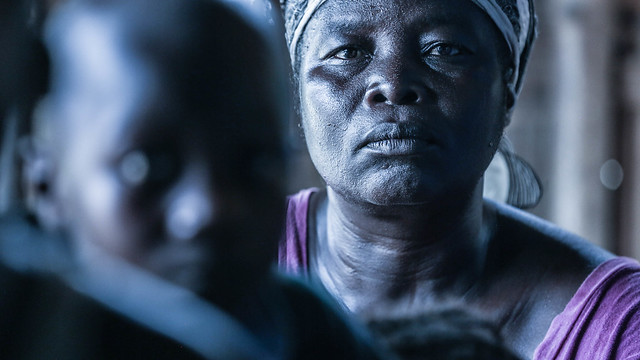African Countries and IMF Dates of Membership
 |
| IMF in Nigeria 2011 |
About The World Bank and International Monetary Fund voting system in Africa.
Established in 1944, The World Bank began operations in 1946 headquartered in Washington, D.C. Lead by Jim Yong Kim since 2012, the Board of Executive Directors elects the President for a five-year, renewable term. The International Monetary Fund (IMF) and the World Bank differ from most public international organizations because they follow a weighted voting system.
Votes are held rarely, but are very important with the election of executive directors, special majorities, and adoption of decisions, to adjust quotas, establish a council, and allocate Special Drawing Rights.
The IMF initial assigning of votes is based on quotas related to economic criteria. These quotas or measures are based upon an exceedingly complex formula that takes into account relative economic strength factors of countries comparable in size and population with the gross domestic product, external reserves, and diversity of exports.
The IMF gives each country 250 basic votes, with a weighted voting of one additional vote for each part of a nation's economic quota or measure equivalent to US$100,000 Special Drawing Rights international reserve asset which was created by the IMF in 1969 to supplement a member country official reserves. The outcome of the economic formula given by the IMF is used to determine the number of shares allotted to each new member country of the bank.
The World Bank has a weighted voting system similar to the IMF. Each member has 250 basic votes plus 1 additional vote for each share of capital equivalent to US $100,000 subscribed. The World Bank based each member's quota on IMF quotas.
Many developing countries interests are not sufficiently voiced despite the April 2010 increase in voting power for developing countries, to 47.19% for International Bank for Reconstruction and Development (IBRD). Since the World Bank bases each member's quota on IMF quotas a change in the IMF quotas would better suit actual transform.
A better solution could be to enlarge the executive boards allowing more representatives of the developing countries. This will allow a louder voice to be heard from the developing countries throughout the world. The developed nations currently control approximately 52.81% of the voting strength while having less than one-fourth of the world population by 2050.
This results in disproportionate representation that is not truly in the interest of the developing countries. International Bank for Reconstruction and Development (IBRD) voting power of African member countries, each country is it's own voting entity unless in a voluntary strategic voting group with other members is formed.
The IMF is a quota-based institution. Quotas are the building blocks of the IMF’s financial and governance structure. An individual member country’s quota broadly reflects its relative position in the world economy. Quotas are denominated in Special Drawing Rights (SDRs), the IMF’s unit of account.
The International Monetary Fund List of Member in Africa
Original members of the International Monetary Fund are Egypt, Ethiopia and South Africa who signed the Articles of Agreement by December 31, 1945.Simple list of African Countries and IMF Effective Date of Membership
Algeria 9/26/1963Angola 9/19/1989
Benin 7/10/1963
Botswana 7/24/1968
Burkina Faso 5/2/1963
Burundi 9/28/1963
Cameroon 7/10/1963
Cape Verde 11/20/1978
Central African Republic 7/10/1963
Chad 7/10/1963
Côte d'Ivoire 3/11/1963
Democratic Republic of the Congo 9/28/1963
Djibouti 12/29/1978
Egypt 12/27/1945
Equatorial Guinea 12/22/1969
Eritrea 7/6/1994
Eswatini (former Swaziland) 9/22/1969
Ethiopia 12/27/1945
Gabon 9/10/1963
Ghana 9/20/1957
Guinea 9/28/1963
Guinea-Bissau 3/24/1977
Kenya 2/3/1964
Lesotho 7/25/1968
Liberia 3/28/1962
Libya 9/17/1958
Madagascar 9/25/1963
Malawi 7/19/1965
Mali 9/27/1963
Mauritania 9/10/1963
Mauritius 9/23/1968
Morocco 4/25/1958
Mozambique 9/24/1984
Namibia 9/25/1990
Niger 4/24/1963
Nigeria 3/30/1961
Republic of Congo 7/10/1963
Rwanda 9/30/1963
São Tomé and Príncipe 9/30/1977
Senegal 8/31/1962
Seychelles 6/30/1977
Sierra Leone 9/10/1962
Somalia 8/31/1962
South Africa 12/27/1945
South Sudan 4/18/2012
Sudan 9/5/1957
Tanzania 9/10/1962
The Gambia 9/21/1967
Togo 8/1/1962
Tunisia 4/14/1958
Uganda 9/27/1963
Zambia 9/23/1965
Zimbabwe 9/29/1980
Part of the Resource Wars Archive
⚡ Explore Geopolitical Intelligence →





















